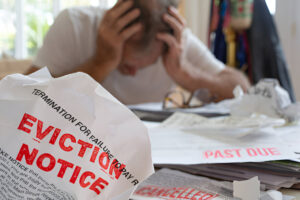Can Bankruptcy Help Texans with Eviction Proceedings A Comprehensive Guide

Facing eviction in Texas is a stressful and overwhelming experience, but bankruptcy can provide relief and legal protections for tenants.
What’s the Best Way to Stop Eviction Proceedings in Texas Through Bankruptcy?
If you’re at risk of eviction in Texas, filing for bankruptcy can temporarily halt the eviction process. This is achieved through an automatic stay, which stops creditors and landlords from taking further action against you. However, the type of bankruptcy you file and your specific situation will determine the extent of relief you can receive.
Chapter 7 Bankruptcy offers temporary relief by pausing eviction proceedings, but if your landlord has already obtained a judgment for possession, the automatic stay may not prevent eviction. Chapter 13 Bankruptcy provides a structured repayment plan that can help you catch up on overdue rent while keeping your home. To maximize protections offered by bankruptcy, act quickly and consult with a qualified attorney who understands tenant protections in Texas.
How Does Bankruptcy Help Tenants Facing Eviction in Texas?
Bankruptcy can offer several protections and benefits for tenants, depending on the stage of the eviction process:
- Before an Eviction Judgment: Filing before your landlord obtains a court judgment pauses eviction proceedings, giving you time to address your financial issues.
- After an Eviction Judgment: The automatic stay generally won’t stop an eviction if the landlord already has a court order, though exceptions may apply for financial hardship.
- Repaying Overdue Rent: Chapter 13 bankruptcy allows you to include overdue rent in your repayment plan, giving you a chance to catch up and avoid eviction.
FAQs About Bankruptcy and Eviction in Texas
Can bankruptcy stop an eviction in Texas? Yes, filing for bankruptcy triggers an automatic stay that can pause eviction proceedings. However, this protection is limited if your landlord already has a court order for eviction.
What happens to overdue rent in bankruptcy? In Chapter 13 bankruptcy, overdue rent can be included in your repayment plan, allowing you to pay it off over three to five years. In Chapter 7, past-due rent may be discharged, but you may still need to vacate the property.
Will bankruptcy ruin my chances of renting in the future? Bankruptcy will appear on your credit report, which landlords may review during the rental application process. However, many tenants successfully rent after bankruptcy by demonstrating financial stability and providing references.
How Bankruptcy Works for Tenants in Texas
Filing for bankruptcy involves several steps that can directly impact eviction proceedings. When you file, the court issues an automatic stay that temporarily halts eviction actions. Your landlord must be notified of the filing, preventing further legal action without court approval. Bankruptcy courts will review your lease, and you may have the option to reject or reaffirm the lease based on your financial situation.
Why Choose Bankruptcy for Eviction Relief in Texas?
Bankruptcy can be a powerful tool for tenants facing eviction. The automatic stay provides instant protection, giving you breathing room to explore options. Bankruptcy also helps address other financial challenges, such as credit card debt or medical bills, which may have contributed to rent struggles. Chapter 13 bankruptcy offers a repayment plan that allows you to catch up on overdue rent while staying in your home.
How Can Kisch Consumer Law Help Texans Facing Eviction?
At Kisch Consumer Law, we understand the stress and urgency of eviction proceedings. Our team provides personalized support and expert legal guidance to help Texans navigate their options. We assess your financial situation to determine the best bankruptcy option for your needs, help you understand your rights as a tenant, and protect you from unfair eviction practices. Whether you need immediate relief through Chapter 7 or a long-term solution through Chapter 13, we’ll guide you every step of the way. Don’t wait until it’s too late—learn how Kisch Consumer Law can help you manage eviction and debt. Visit Kisch Consumer Law today.
Quick Tips for Texans Facing Eviction
Communicate with your landlord, as many landlords are open to payment plans or temporary arrangements if you explain your situation. Know your rights under Texas tenant laws and protections to ensure they are upheld. Filing for bankruptcy early can maximize the legal protections available to you.
What’s the Best Way to Avoid Eviction in Texas?
While bankruptcy can offer significant relief, preventing eviction is always the preferred option. Work with your landlord to negotiate a repayment plan for overdue rent, seek assistance from local housing aid programs in Texas, such as Texas Rent Relief, and consult with a bankruptcy attorney to explore whether bankruptcy is the right solution for your financial situation.
Why Choose Kisch Consumer Law for Eviction and Bankruptcy Assistance?
Kisch Consumer Law offers compassionate, expert guidance for Texans navigating eviction proceedings and bankruptcy. We pride ourselves on deep knowledge of Texas bankruptcy laws, a client-focused approach that prioritizes your long-term financial stability, and proven success in helping tenants protect their homes and rights.
A Comical Yet Serious Note to End On
Let’s be honest: no one wants to pack up and move out unexpectedly. Eviction can feel like a storm rolling in—but bankruptcy can be the umbrella that keeps you dry. Whether you’re a freelancer struggling with fluctuating income or a family hit with unexpected expenses, Kisch Consumer Law is here to help. Don’t let eviction leave you out in the cold—reach out today and regain control of your future. Visit Kisch Consumer Law to learn how we can help you tackle eviction and debt.
